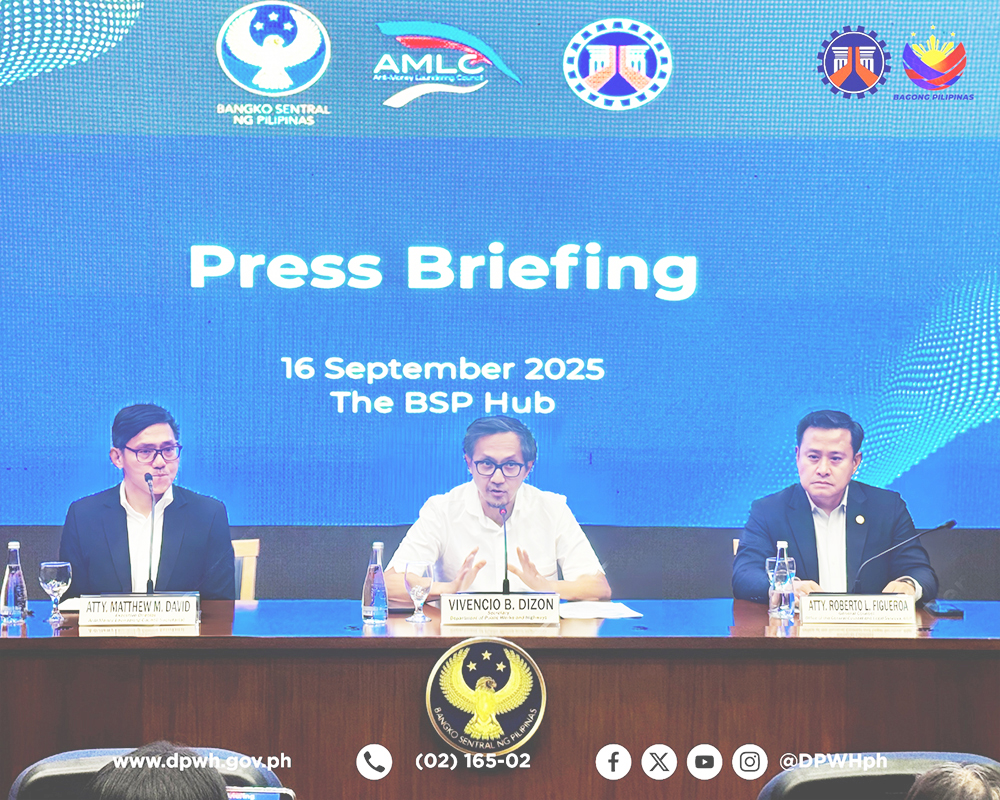The central bank-led Anti Money Laundering Council (AMLC) on Tuesday said the Court of Appeals has ordered the freezing of bank accounts and assets of contractors involved in anomalous flood control projects.
In a late press briefing on Tuesday at the Bangko Sentral ng Pilipinas (BSP), AMLC Executive Director Matthew David said the freeze order has been issued against 135 bank accounts and 27 insurance policies of individuals and corporations following a probe by the Department of Public Works and Highways (DPWH).
The appeals court issued the order in response to a petition filed by the AMLC, the BSP said.
“This is a critical step toward filing appropriate civil and criminal cases, including money laundering and civil forfeiture,” David said.
Initial findings also showed possible money laundering activities involving billions of pesos in public funds allocated to flood control projects, he added.
‘Ensure accountability’
The BSP complements earlier moves by the DPWH which filed a complaint before the Office of the Ombudsman on September 12.
The department identified 26 respondents, of whom 20 are DPWH personnel and six are contractors.
“The banks of the personalities named in the first petition have already been informed to freeze their accounts. This is a huge step to ensure accountability and to make sure that people get their money back,” DPWH Secretary Vivencio Dizon told reporters at the briefing.
“We expect more asset freeze requests in the coming weeks and months,” Dizon added.
AMLC’s David said they will continue to work and closely coordinate with the Solicitor General and other agencies to ensure “public funds are safeguarded from corruption.”
Among those whose assets have been frozen are former OIC–assistant regional director Henry Alcantara, former OIC–district engineer Brice Ericson Hernandez and former OIC–assistant district engineer Jaypee Mendoza.
The DPWH also included in the freeze-asset petition list John Michael Ramos, head of the Construction Section; Lorenzo Pagtalunan, OIC–chief of Maintenance; Ernesto Galang of Planning and Design; Norberto Santos of Quality Assurance and Hydrology; and Jaime Hernandez of Maintenance.
Others in the DPWH petition are Juanito Mendoza of Finance; Roberto Roque of Budget; Floralyn Simbulan of the Administrative Section; Benedict Matawaran of Procurement; and cashier Christina Mae Pineda. Project engineers Paul Jayson Duya, Arjay Domasig, John Carlo Rivera, Merg Jaron Laus, Lemuel Ephraim Roque, Jolo Mari Tayao, and John Benex Francisco are also included in the list.
The DPWH also named private contractors, including Ma. Roma Angeline Rimando, Cezarah Rowena Discaya, and Pacifico Discaya II of St. Timothy Construction Corp.; Mark Allan Arevalo of Wawao Builders; Sally Santos of SYMS Construction Trading; and Robert Imperio of IM Construction Corp.
BSP’s own investigation
Meanwhile, the BSP said it will use the new Anti Financial Account Scamming Act (AFASA), or Republic Act No. 12010, to investigate the accounts linked to the flood control projects scandal.
The BSP said on Tuesday it has already begun looking into the bank accounts of the involved persons upon Dizon’s request.
The AFASA law empowers the BSP to by-pass provisions of the laws on secrecy of deposits and data privacy when investigating suspected financial accounts.
The BSP can also temporarily hold the funds under Section 7 of the AFASA, as implemented by Circular No. 1215, approved this year.
The investigation will focus on the criminal act of money muling. This is an illegal financial account that has obtained, received, deposited, transferred or has withdrawn proceeds from unlawful activities.
Money laundering or “dirty money”, on the other hand, is a tactic used by financial criminals to make it appear their assets and money came from legitimate sources. Dirty money is usually cloaked as transactions to buy property, expensive cars and art, as well as engage in gambling.
First under AFASA
BSP General Counsel Roberto Figueroa said it will be the first central bank investigation and prosecution under the AFASA law of individuals alleged to have committed such crimes.
He said they will “leverage this authority to uphold the integrity of our financial system against criminal actors.”
The BSP will collect and secure material information from the bank accounts, which will be used to prosecute or investigate persons who have committed AFASA-related crimes.
The penalties for money muling include six- to eight-year imprisonment and a fine of P100,000 to P500,000.
“A conviction also carries civil liabilities, which may include restitution for damage done or unwarranted benefit,” the BSP said, adding that “all properties and/or any other non-liquid assets used for the commission of the prohibited acts will also be subject to civil forfeiture, in accordance with Supreme Court rules.”




